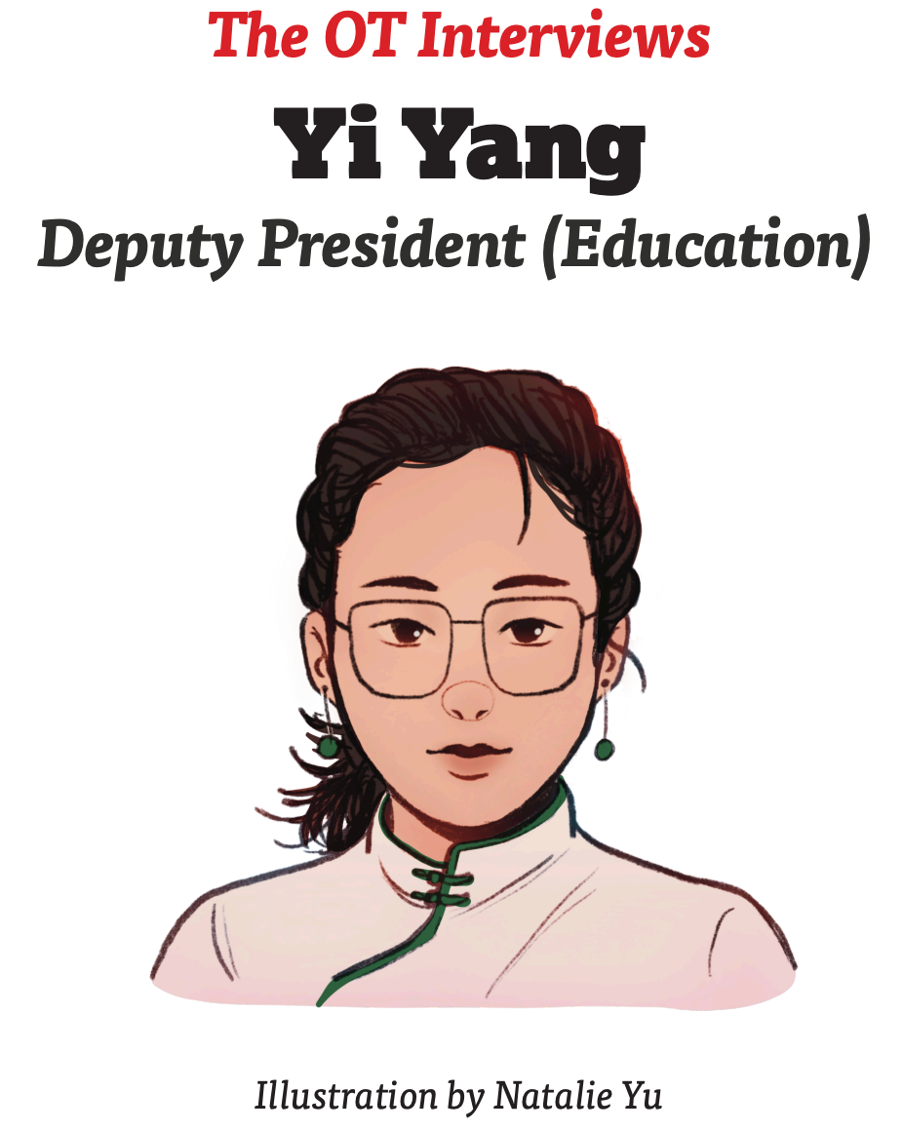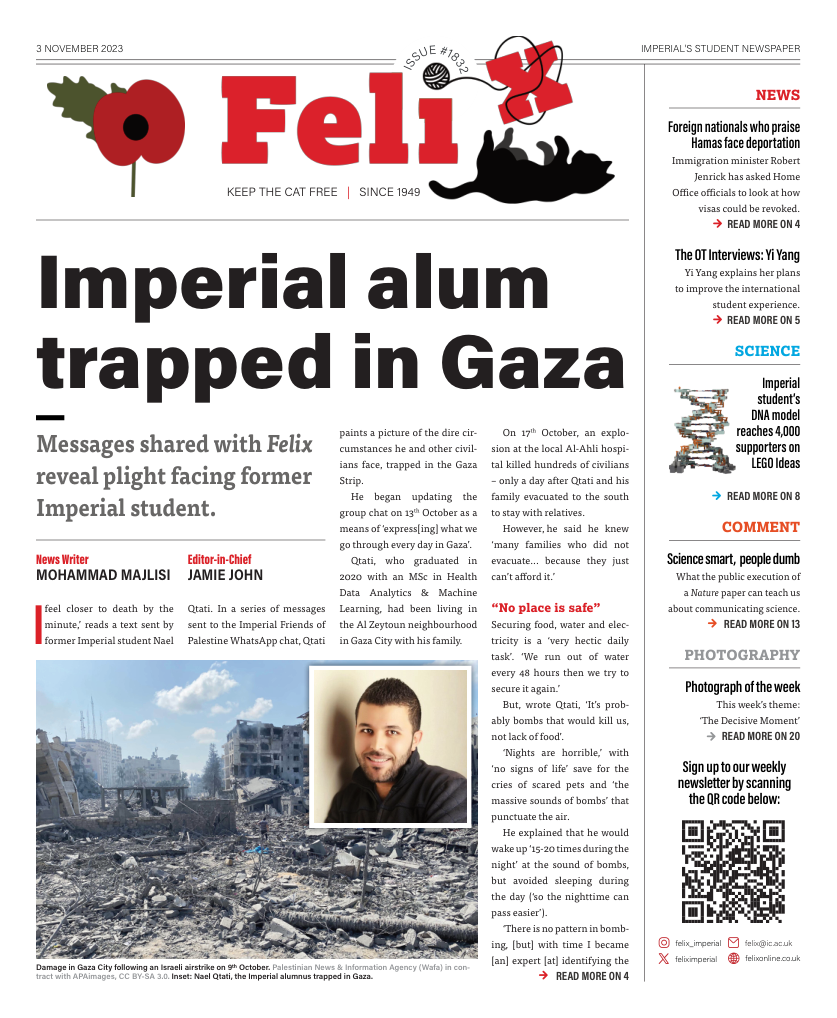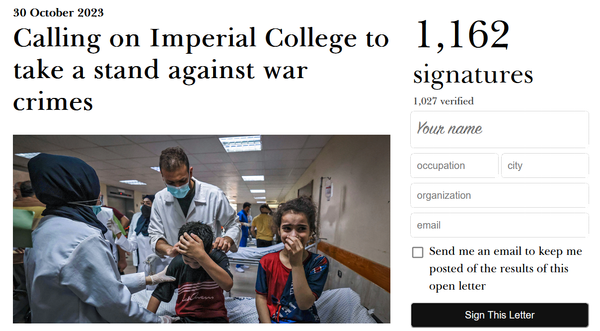The OT Interviews: Yi Yang
In this series, Felix talks to the Union’s Officer Trustees. This week: Yi Yang, DPE.

Yi Yang – like one in every four Imperial students – grew up in China. Her name is rather fitting, given her goals as Deputy President (Education). Yi (pronounced ‘ee’), means wings, and Yang (pronounced ‘young’), means Sun. She tells me her name comes from her parents’ expectations of her: ‘that I can freely develop myself under whatever environment I’m in.’
Yang was born in Shenzhen, Guangdong Province. She spent her early years there in China’s public school system before moving to Hong Kong for her secondary education, attending an international school.
Shenzhen is itself a sprawling metropolis – communist China’s first experiment with market capitalism. But Hong Kong is one of the world’s foremost financial hubs and has a culture distinct to that of mainland China – until 1997, it was a British colony.
Yang says the move to Hong Kong “broadened [her] horizons” .
“Moving to Hong Kong, I had to get used to talking to different people, seeing even small differences in living conditions and culture across the border.”
Nevertheless, relocating to London to study at Imperial was a dramatic change. Yang is studying for an MSci in Geophysics (“a really interesting degree, because so few people at Imperial know it exists”, she says sarcastically).
She tells me that her department was very welcoming, and describes her cohort as “family”. “The senior tutors were really kind to me when I had any difficulties they were good people to talk to and would signpost you to different services.”
In her year group, 30 to 40 of the 90 geophysicists were Chinese international students. “It didn’t really feel like we had a barrier,” she says, explaining how she made friends with a home student who helped introduce her to other locals.
Yang acknowledges that this is not the experience of all international students, saying she is fortunate that there was “that kind of character happy to be a bridge”.
Indeed, she ran for Deputy President (Education) on a campaign that focused almost entirely on bettering the international student experience.
Yang’s goals
- Introduce language support courses for non-native English speakers.
- Strengthen postgraduate student engagement with Imperial College Union (ICU), and discuss changes to the ‘mutual expectation’ documents to guarantee the quality of research support for postgraduate research students (PGRs).
- Provide professional training for student representatives.
- Standardise the Undergraduate Research Opportunities Programme (UROP) application process, and securing further UROP funding.
She tells a story to explain her first goal. “I came from the Chinese public school system. The academic pressure was crazy high, and it started in primary school – we’d be in school from 9am to 5pm, with six lectures a day from the very beginning.”
“Everything got assessed – even PE and Art (okay, Art maybe not). But all hobbies – even art and music were seen as a path to a better future from early education onwards. Everything you learn is to help you get a better future.”
“We were pushed to study hard, because we were told that if you are lazy for even a day, then everyone will outrun you, and you will not be able to catch up.”
“With this kind of pressure, I was expecting exactly the same, or maybe even more ferocious competition at Imperial.”
Yang says that while she does not feel there is a social barrier between home and international students, “one thing we are different on is hobbies.”
“A lot of the Chinese or Asian students I run into are eager to get work done in the library, and then enjoy Fridays and weekends. They start to revise in the middle of term or early in the holidays.”
“So that competitive environment I mentioned earlier does exist for some Asians and international students at Imperial.”
Despite all this effort, Yang observed that the grades of international students were not significantly better than those of home students.
This raised a question in her mind: “Do we actually need to build this ferocious atmosphere? Maybe we can study and learn in a more welcome, warmer environment, without getting too competitive.”
For Yang, building this welcoming environment starts with her first goal for the year: addressing language and communication problems.
Yang’s election campaign said she would ‘lobby to introduce English-as-aSecond-Language courses’ for non-native speakers. But upon assuming the DPE role, and talking to the Centre for Academic English (CfAE), she has come to the conclusion that the existing provision is sufficient.
However, she feels there is a stigma around using the service, admitting that she herself was embarrassed to use the support available.
“I was ashamed to join [CfAE courses], because I’d have to let my friends know that two or three years into my degree, I was accepting language support. Even my parents told me, ‘You’ve been there for three years. There is no way you still have problems writing and communicating.”
She is keen to outline the importance of such support in improving international students’ grades. “We are intellectually at the same level, it’s just that language support is going to boost us that little bit and put us on a level footing.”
Furthermore, she hopes that it will go some way to addressing the loneliness felt by international students away from home.
This year, she intends to promote the existing CfAE service to students, and to gather feedback on what would encourage students to use the service (she is already collecting feedback from a survey sent out earlier in the term).
The CfAE staff are friendly and approachable, she says. “They are willing to help, and actually want to get students involved. They have different courses: 15 minute one-to-one drop-ins to give you advice on spoken language, presentation for speaking, writing workshops, and more.”
Yang says the CfAE is also planning a social-English course specifically targeted at helping students build relationships and make friends.
Do we actually need to build this ferocious atmosphere?
Alongside this, she wants to encourage departments and students to hold more socials (formal and informal) to improve rapport between local and international students. By holding socials, and promoting diverse groups in university coursework, she feels that ‘bubbles of information’ – the different worlds and sets of experiences inhabited by students – can be popped.
Her second goal (to strengthen postgraduate engagement) goes hand in hand with the first. She tells me that 70% of postgraduate taught students (PGTs) are overseas students.
“PGR students are here for three or four years and have time to socialise. But the PGTs – especially the Chinese students – have just graduated from a Chinese university, and are thinking of going back to work in China after graduating. So they stick together with other Chinese students, and don’t have the opportunity to socialise with others.”
Yang says she has been attending PGT welcome talks and social events to understand their difficulties, and will later work with Imperial to come up with solutions.
Her plan to introduce professional training for student representatives feeds into this: more able student representatives will be better equipped to listen to the concerns of their peers and communicate them with the Union.
Her plans for postgraduate research students (such as PhD students) are focused on the mutual expectations document – a form signed by the student and programme leader at the beginning of the course, which outlines what one party can expect from the other. “Revising the document will set a minimum level of help that must be provided to all PGR students.”
UROPs
Yang’s final goal sits apart from her other three, and appears to come from her personal belief in the importance of helping students understand what research entails.
“I want to raise UROPs as an option for students. A lot of students do consider a PhD or research, and UROPs are a great opportunity to figure out what research is, before blindly throwing themselves into it.”
She says the data shows that some groups of students (departments, genders, ethnicities) are underrepresented in UROP placements. She is currently talking to Imperial’s Registry team, analysing the figures and reading a draft report they produced on the topic. Yang plans to lobby the College to provide further funding for UROPs, to help these groups secure placements.
Overall, Yang says she has enjoyed her job so far. There have been difficult moments – tears on some occasions – but she has been encouraged by the support she has received from Union and College staff. She says she is looking forward to the year ahead and says that students can follow her ICU blog to keep up to date with her latest work.
Yang’s parents bestowed upon her a name that urged her to “freely develop myself under whatever environment I’m in”. This year, she will set about helping other international students do the same.








